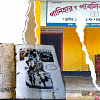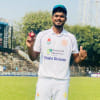Rajshahi’s ‘Bat Doctor’ wants to take over the world
Rajshahi's Hossain Muhammad Aftab, better known as Shahin, earned the nickname 'Bat Doctor' during his school days, for his uncanny ability of fixing any issues related to a cricket bat.
Growing up in the campus of Rajshahi Polytechnic Institute, where his father Md Abdul Khalek was employed as a registrar, his bat-fixing abilities first caught people's attention when he got enrolled at the Al Rashid Cricket Academy.
"I was obsessed with cricket, particularly with bats. Whenever I touched a bat, I could sense its issues. I could tell if the shape of the bat was not correct and how it can be improved," Shahin said at his factory in the Bongram area of the city.
His fascination with the cricket bat would have remained a hobby if not for a violent storm in Rajshahi during his college years which changed the direction of his life forever.
In the path of its devastation, the storm uprooted a Moringa tree in the backyard of Shahin's home. After the storm passed, Shahin saw a piece of the tree lying on the ground and sensed a possibility.
He brought the piece home, took up a knife and began carving it into a toy bat while watching something on television.
"The moment I finished crafting the toy bat, it felt like I've discovered something. After that, I knew deep down, that I could make a real bat someday."
Shahin studied at the wood working department of the Technical Training Center (TTC) in Rajshahi, where he passed his SSC in 2005, and his learnings helped him make his first proper cricket bats out of four pieces of silk cotton (Shimul) wood he procured from a saw mill.
"After I learnt about seasoning at TTC, I seasoned the wood for a month and crafted four cricket bats for playing with tennis balls." He took the bats to a sports shop near Rajshahi New Market and soon found takers for his creation. "I sold those bats and started getting orders. I began supplying regularly. Each bat fetched me Tk 250 at that time."
Gradually, his reputation as a bat repairman grew. Local players were fans of his handiwork and in 2006-7, he got an opportunity to repair the bat of a cricketer from overseas.
Pakistan all-rounder Azhar Mahmood was in Rajshahi and his bat needed a quick fix. Former Bangladeshi skipper Khaled Mahmud called up Shahin. Within half an hour, Shahin mended the bat. Mahmood was surprised and offered payment, which Shahin politely declined, "It was the first time that I mended a foreign cricketer's bat. It was an honour for me."
Life almost came in the way of Shahin fulfilling his calling as after completing his MBA from Southern University in 2010, he took a marketing job in a smartphone company.
But ironically, the time away from his passion made him more determined to pursue it as his job postings in Dhaka, Khulna and Jessore made him realise the untapped potential of the country's sports market.
"Bangladesh's sports market is worth Tk 3500 crore. Of which, cricket's share is over Tk 1000 crore and the bats alone hold more than Tk 300 crore. All this money goes to foreign countries as we import all bats. Why, I wondered, couldn't these bats be crafted on Bangladeshi soil? Was bat-manufacturing a rocket science?"
To find answers to these questions, Shahin looked online and was surprised to learn that the process of manufacturing bats was simpler than he imagined.
"I even found the manufacturing machineries on the web. I showed those to an engineer, who, after several days, built them for me at a fraction of the usual cost."
In 2019, Shahin quit his job and fully embraced his passion. In 2021, Shahin imported some English willow, the key ingredient for international-standard bats, from England on a trial basis and crafted his first batch.
Zimbabwe cricketer Sikandar Raza became the first international player to purchase his bat. Pakistan's Khushdil Shah and Andre Russell of West Indies also bought bats from him.
Shahin, who was already well known among the national team cricketers as the 'Bat Doctor', was now selling his bats to many of them.
Shahin gifted one of those bats to Imrul Kayes, who had been a keen admirer of his world for a long time.
"I met him 10-12 years ago when I was in the national team. I went to him to fix my bat and I was very impressed with his work. I asked him a while back why he doesn't make bats himself," Imrul told the Daily Star.
In response, Shahin said he didn't have a way to import English Willow to start production.
But seeing that Shahin has produced his first batch, Imrul approached him about joining hands and starting a bat manufacturing company, to which Shahin said yes.
Bangladesh all-rounder Mehedi Hasan Miraz also got on board and thus began the journey of MKS Sports.
The name 'MKS' is an acronym of the names of the three partners.
The biggest moment for the new company came on December 11, when it received the coveted approval of the International Cricket Council (ICC), which opened the door for them to proudly display its monogram on bats in international cricket.
By 2023, MKS Sports sent trial batches of 10 bats to England, the USA and Australia each, and received positive feedback.
With more willow set to be imported by February next year, MKS Sports plans to fully start production by manufacturing 3000 bats.
MKS Sports will have to compete against Indian and Pakistani bat manufacturers who have more than 50 years of experience in order to carve out a space for themselves in the market.
Still, Shahin is optimistic about first making a mark in the local sphere and then taking over the world.
"We will learn from our mistakes. We will meet our local demands first and then compete in the global market, offering quality and cost-effective alternatives to established brands".

 For all latest news, follow The Daily Star's Google News channel.
For all latest news, follow The Daily Star's Google News channel. 








Comments